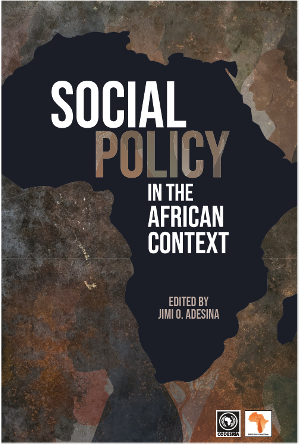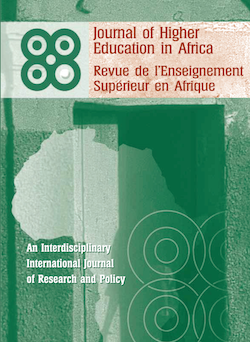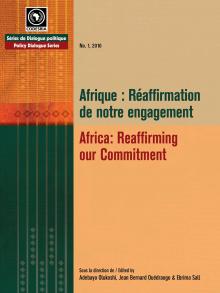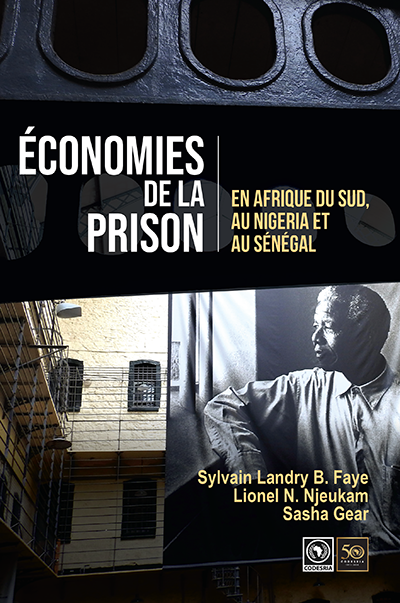Welcome
CODESRIA publications can be purchased through this online bookshop. The payment can be done with a credit card or Paypal account.
Best Selling Books
CHASING FREEDOM Histories, Analyses and Voices of Student Activism in South Africa
CHASING FREEDOM Histories, Analyses and Voices of Student Activism in South Africa
Zukiswa Mqolomba is a former SRC President of the University of Cape Town, former Provincial Executive Committee member of SASCO and alumnus student leader. She is a Mandela Rhodes Scholar and Chevening scholar. She has two master’s degrees and also holds an executive leadership training certificate. Mqolomba now works for the Presidency of the Republic of South Africa.
Suntosh R. Pillay is a clinical psychologist and researcher in the public sector in Durban, South Africa, with roots in student journalism, community mobilizing and mental health advocacy. He completed his Masters in Social Sciences degree at the University of KwaZulu-Natal (UKZN), and is affiliated to UKZN’s Department of Clinical Medicine. He is committed to developing critical psychopolitical theory and practices in South Africa.
The Concept of HUMAN RIGHTS in Africa (Second Edition)
The Concept of Human Rights in Africa attempts to reconceptualise human rights ideology from the stand point of the working people of the continent. lt argues that the dominant human rights discourse in/and on Africa, however well-intentioned, is objectively a part of the ideologies of domination. Both the critique of the dominant discourse as well as the reconceptualisation are located firmly within the current social science and jurisprudential debates on democratic struggles in Africa. Hitherto, the human rights debate in Africa has been an exclusive preserve of lawyers and philosophers. Professor Shivji breaks new ground in this book in that he firmly anchors the debate on the social and political planes without losing sight of its legal and philosophical dimensions.
While greatly stimulating for the general reader, this work can be fruitfully used in colleges and universities in such academic disciplines as sociology, political science, development studies, law, and jurisprudence.
Issa Shivji is Professor Emeritus of Law at the University of Dar es Salaam, Tanzania. He taught law at the University of Dar es Salaam for 36 years (1970-2006). He was appointed the first Mwalimu Julius Nyerere Professor in Pan-Africanism between 2008-2013. He was the Director of the Nyerere Resource Centre at the Commission for Science and Technology (2014- 2019). He has published over a dozen books and numerous book chapters and articles. His latest book is a three-volume biography of Julius Nyerere called Development as Rebellion co-authored with other two colleagues.
ISBN 978 2 38234 100 1
CODESRIA 2023
Social Policy in the African Context (Ebook)
The ‘counter-revolution’ in Development Economics in the 1980s fundamentally altered the way the state ‘thinks’, which is evident in the state’s retrenchment and reconstitution of the state’s relationship to its citizens. The combination of deflationary macroeconomic policies and a residual approach to social policy, broadly, and social provisioning, more specifically, fundamentally altered the post-colonial trajectory of public policy in Africa. Despite the neoliberal ascendance that nurtured the more residual direction of social policy, the contention for an alternative vision of social policy remained and advanced with vigour. Specific contributions range from the deployment of social policy in framing the nation-building project, endogenous mutual support institutions, land and agrarian reform as a social policy instrument, the gender dynamics of social policy, and the mechanism enabling the spread of cash transfer schemes on the continent.
Featured Books
HOME AND EXILE: FORCED MIGRATIONS AND SOUTH SUDANESE REFUGEES IN KENYA’S KAKUMA REFUGEE CAMP
The story of humankind is about the search for hospitable places to call home. Migration is historically a part of this story. People have left one place for the other, based on challenges in the place of origin, and perceived attractions in the desired destinations. In emergency migrations, the character of the African refugee camp at the end of the twentieth Century has gradually transformed into that of an intermediate stage in incomplete migrations.
Barrack O. Muluka
Codesria 2023
ISBN 978 2 38234 098 1
Les matérialités contemporaines du religieux aux frontières du privé
Les matérialités contemporaines du religieux aux frontières du privé
Dans les sociétés ouest-africaines, l’espace public est fortement imprégné de religiosités. Il s’y édicte une kyrielle de conduites à tenir susceptibles d’influencer les croyants. Comprendre ces dynamiques religieuses implique de saisir comment ces normes pénètrent la vie privée des individus, et comment les croyants – chrétiens et musulmans – se saisissent de ces normes, les mettent en scène ou les détournent dans leur quotidien. Fruit d’un travail collectif mené dans l’ANR « Priverel », en partenariat avec les universités de Ouagadougou (Burkina Faso), Abomey Calavi (Bénin) et Gaston Berger (Saint-Louis, Sénégal), cet ouvrage s’appuie sur la notion « d’espace privé religieux » pour analyser l’appropriation par les croyants des normes religieuses au Bénin, au Burkina Faso, en Côte d’Ivoire et au Sénégal.
LA DIPLOMATIE DE LA REPUBLIQUE DE GUINEE – Passé, présent et avenir
LA DIPLOMATIE DE LA REPUBLIQUE DE GUINEE
Passé, présent et avenir
La République de Guinée est devenue indépendante le 2 octobre 1958. En matière de politique étrangère, l’on constate des continuités ? travers tous les régimes en ce qui concerne certains fondements. Mais si la première République (1958-1984) a mis l’accent sur les considérations d’ordre idéologique, les régimes successifs depuis 1984 se sont concentrés plutôt sur les aspects économiques. Cet ouvrage présente les contextes géopolitiques de la diplomatie guinéenne depuis l’indépendance et porte un regard critique sur les moyens humains et les infrastructures à l’aide desquels elle s’est déployée. Il analyse la nature et les facteurs explicatifs des relations bilatérales entre la Guinée et certains des pays avec lesquels elle a entretenu des relations particulières. Il s’intéresse aussi aux actions multilatérales du pays dans les cadres notamment de la CEDEAO, de l’OUA/UA et de l’ONU. Le dernier chapitre porte un regard prospectif sur l’avenir de la diplomatie guinéenne à l’ère du numérique. Il s’appuie sur un solide rappel des théories de relations internationales dans la première partie, et une riche littérature en français et en anglais, y compris des documents officiels sur les différents aspects du livre. Il a bénéficié de beaucoup d’entretiens avec de nombreux diplomates guinéens.
Diversité et essence des arts panafricains / Diversity and the Essence of Pan-African Arts
Diversité et essence des ARTS PANAFRICAINS / Diversity and the essence of Pan-African Arts
Les arts, la production artistique et littéraire en Afrique sont des échos du patrimoine culturel africain dans ses diversités, son essence, ses valeurs, ses réalités et ses contradictions. Ces résonances se traduisent de différentes manières d’une période à l’autre et d’une culture à l’autre. Elles propagent l’image authentique que l’Afrique se fait d’elle-même dans ses enthousiasmes, ses souffrances, ses malaises, ses défi s et sa résilience pour se dépasser, vivre le présent et imaginer son avenir. L’ensemble des chapitres de ce livre a été présenté pour la première fois dans le cadre de l’Institut sur les sciences humaines du CODESRIA qui s’est tenu en marge du Festival panafricain du cinéma et de la télévision, le Fespaco, à Ouagadougou, au Burkina Faso, en 2019. L’institut a réuni des chercheurs et des artistes africains pour réfléchir aux possibilités et aux implications de la (re)constitution de la mémoire et de l’histoire des arts (pan)africains dans le cadre d’un processus de problématisation des attitudes envers le passé et l’avenir.
Bouchra Sidi-Hida est docteure en sciences sociales de l’Université catholique de Louvain (UCL), Belgique. Elle a été chercheure séniore au CERSS au Maroc et est actuellement Administrateur de programme au CODESRIA. Sidi-Hida est chercheure associée à plusieurs centres de recherche dont le LPED de l’Université Aix Marseille, France. Elle est auteure de plusieurs articles et ouvrages et membre de plusieurs réseaux de recherche internationaux tel LMI Movida sur la migration.
——-
The Arts, artistic, and literary production in Africa are echoes of Africa’s cultural heritage in its diversities, essence, values, realities, and contradictions, being transmitted across generations. These resonances are translated in different ways from one period to another and from one culture to the other. They propagate the authentic image that Africa has of itself in its enthusiasms, its sufferings, its discomforts, its challenges, and its resilience to surpass itself, live the present, and imagine its future. The collection of chapters in this book was first presented as part of the CODESRIA Humanities Institute that took place on the sidelines of the bi-annual Pan-Africa Film and Television Festival, Fespaco, in Ouagadougou, Burkina Faso in 2019. The institute convened African researchers and artists to reflect on the possibilities and implications of (re)making the memory and history of the (Pan)African arts, as part of a process of problematizing attitudes toward the past and the future.
Bouchra Sidi-Hida holds a Ph.D. in social sciences from the Catholic University of Louvain (UCL), Belgium. She has been a senior researcher at CERSS in Morocco and is currently Programme Officer at CODESRIA. Sidi-Hida is an associate researcher with several research centres including the LPED of the University of Aix Marseille, France. She is the author of several articles and books and a member of several international research networks such as LMI Movida on migration.
All our Books
Yes in my lifetime
Saida Yahya-Othman is a retired Associate Professor of the University of Dar es Salaam, where she worked for over 40 years. She trained at the Universities of Dar es Salaam, York and Edinburgh, in English linguistics, and has taught and published largely in that area, particularly discourse analysis and pragmatics. In 1972 she married Haroub Othman, who died in 2009. She lives in Dar es Salaam, where she does pre-publication work.
ISBN 9789987082834
2013
JUSTICE DURING TRANSITIONS – Policies that Reflect African Realities
JUSTICE DURING TRANSITIONS – Policies that Reflect African Realities
Transitional justice interventions, particularly in Africa, have failed. In this context, there is a growing interest in tradition-based community-led practices for resolving justice. Yet little is known or understood about these practices on their own terms, and what role they play in transitional justice on the continent. This volume challenges some of the underlying assumptions of current responses to mass violence on the continent, including the way these are embedded in state-centricism and an international justice system that lacks relevance in relation to the day-to-day realities of rural African communities. Through the case studies of Zimbabwe, Burundi and Mozambique the volume explores some of the limitations and possibilities with regard to justice during transitions.
Universidades Publicas em Angola, Moçambique e Cabo Verde
Esta reflexao sobre a Universidade nos paises africanos de lingua portuguesa realizada por Teresa Cruz e Silva constitui-se como leitura obrigat6ria para tod@s que se interessam por conhecer as diferencàs dos percursos na construcào do pensamento social nos nossos paises. Mas mais do que isso, a analise da autora percorre e descobre caminhos que debatendo as herancàs da dominacào colonial portuguesa ea ordem politica instaurada corn as independencias nacionais, recorre corn rigor as singularidades das relacòes entre poder politico ea Universidade.
Maria da Conceicà o Osorio,
Professora aposentada, Universidade Eduardo Mondlane
Universidades Publicas em Angola, Mocàmbique e Cabo Verde: Experiencias de mudancà e desafios de liderancà da autoria de Teresa Cruze Silva, dada a estampa pelo CODESRIA, faz um diagnòstico assaz profundo e instigante do ensino superior nos Paises Africanos de Lingua Oficial Portuguesa. Relevante tambem e a analise feita sobre as liderancàs universitarias, ainda maioritariamente gerontocraticas, que coartam as possibilidades de um maior protagonismo de docentes, pesquisadoras e gestoras no desenvolvimento e consolidacào das universidades. Estamos perante um trabalho que merece uma leitura atenta.
Claudio Alves Furtado
Universidade de Cabo Verde – Uni-CV Professor Associado, Coordenador do PIC-Belgica
ISBN 978 2 38234 045 5
CODESRIA 2023
Intellectuels, nationalisme et idéal Panafricain
Intellectuels, nationalisme et idéal panafricain – Perspective historique
” Rassembler dans un ouvrage cohérent les actes d’un colloque est souvent un véritable défi. Thierno Bah a réussi áa relever ce défi de façon crédible. La perspective historique qui constitue le fil d’Ariane des textes choisis aidera súrement le lecteur áa appréhender la crise multidimensionnelle de l’afrique dáujourd’hui par l’éclairage de son passé et áa apprécier la pertinence des solutions suggérées. Nul doute que tous ceux que le destin de notre continent ne laisse pas indifférents trouveront l’ouvrage fort utile ”.
Elisée Soumonni, Historien, Cotonou (Bénin), pr;ec;edemment Professeur á l’Université Nationale du Bénin, Abomey-Calavi
” Cette riche collection éditée par Thierno Bah montre á quel point une perspective historique peut aider á comprendre les dilemmes des intellectuels africains celui entre liberté de pensée et responsablilité morale; et, plus spécifiquement, celui entre nationalisme et panafricanisme. Une question capitale revient partout dans le livre: dans quelle mesure le panafricanisme historique pourrait-il aider á surmonter la crise tenace de l’Etat-nation sur le continent ” ?
Professeur Peter Geschiere, Université d’Amsterdam, Pays-Bas
The Concept of HUMAN RIGHTS in Africa (Second Edition)
The Concept of Human Rights in Africa attempts to reconceptualise human rights ideology from the stand point of the working people of the continent. lt argues that the dominant human rights discourse in/and on Africa, however well-intentioned, is objectively a part of the ideologies of domination. Both the critique of the dominant discourse as well as the reconceptualisation are located firmly within the current social science and jurisprudential debates on democratic struggles in Africa. Hitherto, the human rights debate in Africa has been an exclusive preserve of lawyers and philosophers. Professor Shivji breaks new ground in this book in that he firmly anchors the debate on the social and political planes without losing sight of its legal and philosophical dimensions.
While greatly stimulating for the general reader, this work can be fruitfully used in colleges and universities in such academic disciplines as sociology, political science, development studies, law, and jurisprudence.
Issa Shivji is Professor Emeritus of Law at the University of Dar es Salaam, Tanzania. He taught law at the University of Dar es Salaam for 36 years (1970-2006). He was appointed the first Mwalimu Julius Nyerere Professor in Pan-Africanism between 2008-2013. He was the Director of the Nyerere Resource Centre at the Commission for Science and Technology (2014- 2019). He has published over a dozen books and numerous book chapters and articles. His latest book is a three-volume biography of Julius Nyerere called Development as Rebellion co-authored with other two colleagues.
ISBN 978 2 38234 100 1
CODESRIA 2023
Afrique réaffirmation de notre engagement / Africa reaffirming our commitment
Afrique réaffirmation de notre engagement / Africa reaffirming our commitment
La série Dialogue politique a été conçue dans le but de créer un consensus autour d’une approche concrète à adopter pour confronter les défis majeurs du continent africain. Afrique : Réaffirmation de notre engagement a été ainsi conçu pour examiner les fondations économiques de nos états et la question de la dignité des africains en tant qu’êtres humains. Aujourd’hui, nous agissons dans un contexte de globalisation féroce où les règles du jeu reposent sur la suprématie économique et militaire; domaines dans lesquels l’Afrique est toujours en traine. L’objectif de ce livre n’est pas de se lamenter ou de montrer du doigt ceux qui sont à la base des maux de l’Afrique, mais plutôt de réfléchir sur les moyens et de proposer des stratégies qui ont pour but de nous libérer de la pauvreté et de l’oppression, et encore plus important, d’identifier les moyens d’accélérer le développement de l’Afrique. Cette édition propose les voies et moyens qui permettront à nos gouvernements d’être réellement au service des africains. Elle suggère les voies qui mènent vers l’établissement de sociétés pacifiques, harmonieuses, justes et équitables dans une Afrique où les citoyennetés locale et panafricaine seront une réalité. Ce livre fait la plaidoirie des identités collectives et les sociétés inclusives sur la base d’une vision redéfinie de notre future à travers une nouvelle éducation et un mode de socialisation dans les écoles et autres institutions nationales.
Adebayo Olukoshi
Jean Bernard Ouédraogo
Ebrima Sall
ECONOMIES DE LA PRISON EN AFRIQUE DU SUD, AU NIGERIA ET AU SÉNÉGAL
ECONOMIES DE LA PRISON EN AFRIQUE DU SUD, AU NIGERIA ET AU SÉNÉGAL
Cet ouvrage propose une ethnographie de l’institution carcérale dans trois pays africains et rend compte de ses évolutions/appropriations dans le temps. En décrivant les acteurs avec leurs interactions/transactions, les productions de légitimités et constructions identitaires qui y ont cours, la perméabilité des frontières entre le dedans et dehors, il lève le voile sur la structuration des espaces carcéraux et de l’économie des valeurs qui y circulent et la confrontation des logiques formelles et informelles qui gouvernent leur quotidien. L’approche comparée de cette question sur plusieurs terrains avec diverses approches disciplinaires permet de sortir de l’image d’une prison « africaine » réifiée comme un espace clos, et de l’envisager comme un système de transactions sociales (valeurs, biens, services), de circulations de pouvoirs, de production de statuts, de rapports de domination, dans différents contextes socio-politiques africains. La question de la prison ouvre aussi à la réflexion sur les rapports entre le local et le global. Si les formes diversifiées d’expériences de la prison traduisent des héritages singuliers, elles s’articulent aussi à des cultures politiques contemporaines, avec des modèles de « bonnes pratiques » et des principes gestionnaires « voyageurs » qui participent ainsi à façonner le paysage des systèmes pénitentiaires et à construire les États africains.
Tombouctou: Pour une histoire de l’érudition en Afrique de l’Ouest
Cet ouvrage est fascinant à lire pour tous ceux qui souhaitent percer l’aura de mystère et de légende qui s’est construit autour de Tombouctou. Tombouctou : pour une histoire de l’érudition en Afrique de l’Ouest s’efforce de contextualiser et de clarifier l’importance pour, le Mali, l’Afrique et le reste du monde, des efforts déployés en vue de préserver les manuscrits de Tombouctou.
Diversité et essence des arts panafricains / Diversity and the Essence of Pan-African Arts
Diversité et essence des ARTS PANAFRICAINS / Diversity and the essence of Pan-African Arts
Les arts, la production artistique et littéraire en Afrique sont des échos du patrimoine culturel africain dans ses diversités, son essence, ses valeurs, ses réalités et ses contradictions. Ces résonances se traduisent de différentes manières d’une période à l’autre et d’une culture à l’autre. Elles propagent l’image authentique que l’Afrique se fait d’elle-même dans ses enthousiasmes, ses souffrances, ses malaises, ses défi s et sa résilience pour se dépasser, vivre le présent et imaginer son avenir. L’ensemble des chapitres de ce livre a été présenté pour la première fois dans le cadre de l’Institut sur les sciences humaines du CODESRIA qui s’est tenu en marge du Festival panafricain du cinéma et de la télévision, le Fespaco, à Ouagadougou, au Burkina Faso, en 2019. L’institut a réuni des chercheurs et des artistes africains pour réfléchir aux possibilités et aux implications de la (re)constitution de la mémoire et de l’histoire des arts (pan)africains dans le cadre d’un processus de problématisation des attitudes envers le passé et l’avenir.
Bouchra Sidi-Hida est docteure en sciences sociales de l’Université catholique de Louvain (UCL), Belgique. Elle a été chercheure séniore au CERSS au Maroc et est actuellement Administrateur de programme au CODESRIA. Sidi-Hida est chercheure associée à plusieurs centres de recherche dont le LPED de l’Université Aix Marseille, France. Elle est auteure de plusieurs articles et ouvrages et membre de plusieurs réseaux de recherche internationaux tel LMI Movida sur la migration.
——-
The Arts, artistic, and literary production in Africa are echoes of Africa’s cultural heritage in its diversities, essence, values, realities, and contradictions, being transmitted across generations. These resonances are translated in different ways from one period to another and from one culture to the other. They propagate the authentic image that Africa has of itself in its enthusiasms, its sufferings, its discomforts, its challenges, and its resilience to surpass itself, live the present, and imagine its future. The collection of chapters in this book was first presented as part of the CODESRIA Humanities Institute that took place on the sidelines of the bi-annual Pan-Africa Film and Television Festival, Fespaco, in Ouagadougou, Burkina Faso in 2019. The institute convened African researchers and artists to reflect on the possibilities and implications of (re)making the memory and history of the (Pan)African arts, as part of a process of problematizing attitudes toward the past and the future.
Bouchra Sidi-Hida holds a Ph.D. in social sciences from the Catholic University of Louvain (UCL), Belgium. She has been a senior researcher at CERSS in Morocco and is currently Programme Officer at CODESRIA. Sidi-Hida is an associate researcher with several research centres including the LPED of the University of Aix Marseille, France. She is the author of several articles and books and a member of several international research networks such as LMI Movida on migration.
LA DIPLOMATIE DE LA REPUBLIQUE DE GUINEE – Passé, présent et avenir
LA DIPLOMATIE DE LA REPUBLIQUE DE GUINEE
Passé, présent et avenir
La République de Guinée est devenue indépendante le 2 octobre 1958. En matière de politique étrangère, l’on constate des continuités ? travers tous les régimes en ce qui concerne certains fondements. Mais si la première République (1958-1984) a mis l’accent sur les considérations d’ordre idéologique, les régimes successifs depuis 1984 se sont concentrés plutôt sur les aspects économiques. Cet ouvrage présente les contextes géopolitiques de la diplomatie guinéenne depuis l’indépendance et porte un regard critique sur les moyens humains et les infrastructures à l’aide desquels elle s’est déployée. Il analyse la nature et les facteurs explicatifs des relations bilatérales entre la Guinée et certains des pays avec lesquels elle a entretenu des relations particulières. Il s’intéresse aussi aux actions multilatérales du pays dans les cadres notamment de la CEDEAO, de l’OUA/UA et de l’ONU. Le dernier chapitre porte un regard prospectif sur l’avenir de la diplomatie guinéenne à l’ère du numérique. Il s’appuie sur un solide rappel des théories de relations internationales dans la première partie, et une riche littérature en français et en anglais, y compris des documents officiels sur les différents aspects du livre. Il a bénéficié de beaucoup d’entretiens avec de nombreux diplomates guinéens.

















